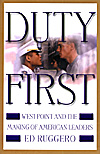 Harper Collins, 2001, $27.50, ISBN: 0-06-019317-4, 342 pages
Harper Collins, 2001, $27.50, ISBN: 0-06-019317-4, 342 pages
Ed Ruggero was an Army officer for 11 years and graduated from West Point, so he has the experience to talk about putting in four years at the US Military Academy. From his account, it is a grueling challenge of body and mind, where sleep and time become the commodities in greatest demand. And while some of the more hazing-style traditions have slowly died away, enough continue to keep cadets on their toes--even if graduates bemoan the loss of said traditions and complain these new cadets have it easier than previous classes.
Ruggero follows several cadets through four years of West Point, mixing anecdotes with observations and his own experiences. He interviews civilian faculty and Army officers, and provides a well-rounded study of this specialty "college" and its curriculum and social life.
There's not a lot of college hi-jinks to report, just meticulous grooming, and culling, of people fit to lead soldiers into battle. Physical fitness is a must, and the descriptions of various obstacle courses, mountaineering exercises, and hikes remind you that for all the Abrams and Bradleys in the field, the basic infantry hoofs it. And from the few times I've been to the US Military Academy to attend shows and weddings, you can certainly get a feel about the grounds even if you've never set foot up there--although I would describe it in much more "hilly" terms.
There are exercises for individuals and units. Ultimately, it's all about teamwork, and Ruggero blends the two nicely. He writes well, and his prose plunks you right in the middle of the activity. It is, after all, a very positive book. Yet understand that war brings out success and failure, and while we like to dwell on success, failures are a part of life, from the cadet that quits to those that do something stupid.
- "The notion that failing--and the learning opportunity that follows--must be part of leader development is not just a heretical idea held by a few social scientists toiling away in the windowless offices of Thayer Hall.
'You have to be able to fail and learn from it,' Brigadier General John Abizaid, Commandant of Cadets, says. 'I talk about my screwups; God knows I have plenty of material. People have to know that they can learn from their mistakes. We do ourselves a disservice with the idea that we want people who don't fail.'
...[from his lecture at Infantry Tactics Club]...
'Leadership is the most dynamic aspect of combat power,' he reads. He looks up. 'No technology can give you the advantage that good old-fashioned leadership can give you. You can have spy planes overhead and all kinds of information downloaded to the G-2 [intelligence section]. If the lieutenant and sergeant on the ground don't do their duty, we will fail.'
'When you hear stories like this [junior officer screwup in Bosnia], you should have a couple of reactions: First you should think, "But for the grace of God, that could have been me." This lieutenant was lucky. His company commander was looking out for him.'
'Second, you should read about these disasters because you don't want it to happen to you. You don't want them writing a book about your big screwup.'
'Your job is to wargame, to think through what might happen. We want you to be tactical leaders, to avoid the mistakes of Little Big Horn, of Grenada." [pages 200, 207-208]
Now, among all this lightness of being, there are dark underpinnings to be found at West Point--bulimia among the women, for example, since West Point's religion is exercise and fitness, and you can add verbal hazing, loss of identity, and overeager applications of the Honor Code to dot the four-year landscape. Ruggero touches all these points in his book, but only briefly. Complaining must be a sign of weakness.
On the other hand, West Point is no place for the inattentive and free spirits, because ultimately, the graduates could be assigned to a war zone to face life and death decisions. Part of the culture of West Point, and this becomes pounded into cadets, is to immediately deal with such decisions--with everything from an absence of information to an overload of priorities--and have the courage to make the right choices.
When cadets first enter West Point, they are given a choice of four responses to anything: "Yes, sir," "No, sir," "No excuse, sir," and "Sir, I do not understand." If it sounds robotic, you have to remember the old joke that there's your way, my way, and the Army way. Ruggero contends that those who learn the underlying lessons of West Point--courage, commitment, honor, and so forth--are better prepared to take on the responsibilities of life in military or civilian occupations.
Maybe. Maybe not. It would be interesting to have Ruggero write another book 10 or 15 years in the future that follows the cadets and see what they have done since graduation. I for one would look forward to it. In the meantime, Duty First will provide an excellent idea of cadet life.
Back to List of Book Reviews: Modern
Back to Master Book Review List
Back to Master Magazine List
© Copyright 2001 by Coalition Web, Inc.
This article appears in MagWeb (Magazine Web) on the Internet World Wide Web.
Other military history articles and gaming articles are available at http://www.magweb.com